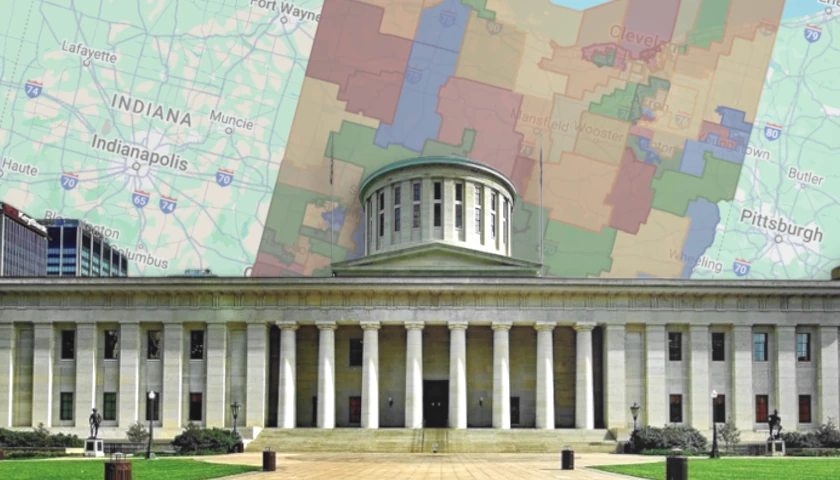One day after Wednesday’s Pennsylvania Supreme Court decision imposing a Democrat-favored congressional map, State Senator David Argall (R-Mahanoy City) is legislating to limit similar future rulings.
Argall, who chairs the Senate State Government Committee, asked colleagues to co-sponsor a measure disallowing any congressional-district plan ordered by a court to remain in effect after the election cycle for which it was enacted.
Lawmakers must remap congressional districts every decade to ensure that all districts contain an equal number of residents and that the relative size of each state’s congressional delegation coincides with population trends. Because Pennsylvania’s population growth has lagged behind that of most other states, Pennsylvania will lose one of its 18 congressional districts this year.
The General Assembly passed a redistricting plan initially drafted by a private citizen, Amanda Holt of Lehigh County, and later modified by the House State Government Committee. Although the redrawn map improved Republicans’ electoral advantage in the districts now held by U.S. Representative Conor Lamb (D-PA-17) and Matt Cartwright (D-PA-8), the nonpartisan Princeton Gerrymandering Project gave the plan high marks for fairness to both parties.
Governor Tom Wolf (D) nonetheless vetoed the map, insisting it was “skewed” against his own party. He urged enactment of a plan that would have helped Democrats, notably by giving Bucks County-based Representative Brian Fitzpatrick (R-PA-1) a long-shot reelection battle.
After Wolf and legislators failed to finalize a new map on schedule, the Pennsylvania Commonwealth Court stepped in to do so. While Republican Judge Patricia A. McCullough determined that the legislature’s plan was the most worthy of implementation, the Democrat-controlled state Supreme Court overruled her and imposed a different map.
The winning “Carter Plan,” named after lead petitioner Carol Ann Carter, explicitly aimed to change the present congressional districts’ shapes as little as possible while nixing one of them. While the governor did not get his own office’s redistricting scheme enacted, he has voiced enthusiasm for the Carter Plan. (Most of the plaintiffs for the new map have donated to Democratic campaigns, including Wolf’s.)
Indeed, the prevailing new map appears likely to help Wolf’s party, first by making Lamb’s and Cartwright’s moderate districts slightly bluer, and secondly by eliminating a Northern Pennsylvania seat and forcing two Republican congressmen — Fred Keller (R-PA-12) and Glenn Thompson (R-PA-15) — into the same district.
Because almost all of the new 15th District is in Thompson’s current political territory, Keller would have found it especially difficult to win a primary there. Although Keller lives outside of the 9th District now held by Representative Dan Meuser, both Keller and Meuser have announced they will run this year to represent the reshaped 9th District. Meuser goes into this contest with the advantage, insofar as he has more constituents living within the new 9th District than Keller does.
The new map does however give the GOP a fighting chance at picking up a seat in the Lehigh Valley since the district now held by Representative Sharon Wild (D-PA-07) is shifting from 51 percent Democratic to 51 percent Republican.
Nonetheless, Argall and other Republicans have denounced the state Supreme Court’s instatement of a district scheme that state lawmakers had no role in creating. The federal Constitution vests state legislatures with the responsibility to determine when, where, and how to conduct congressional elections.
“Now that the Pennsylvania Supreme Court has chosen to gerrymander the state’s congressional districts for the second time in four years, it becomes imperative to limit the drawing of congressional districts to the General Assembly, as the United States Constitution requires,” Argall wrote.
When Argall says “for the second time,” he is referring to the court’s decision in 2018 to not only toss out a congressional map that had been in effect for three previous elections but also to redesign the map themselves. While there was precedent for judges picking a new map under certain circumstances, no precedent nor explicitly statutory authority existed for a court redrawing the map itself.
Like this week’s ruling, the court’s 2018 decision improved the congressional landscape for Keystone State Democrats.
– – –
Bradley Vasoli is managing editor of The Pennsylvania Daily Star. Follow Brad on Twitter at @BVasoli. Email tips to [email protected].
Photo “David Argall” by David Argall.





